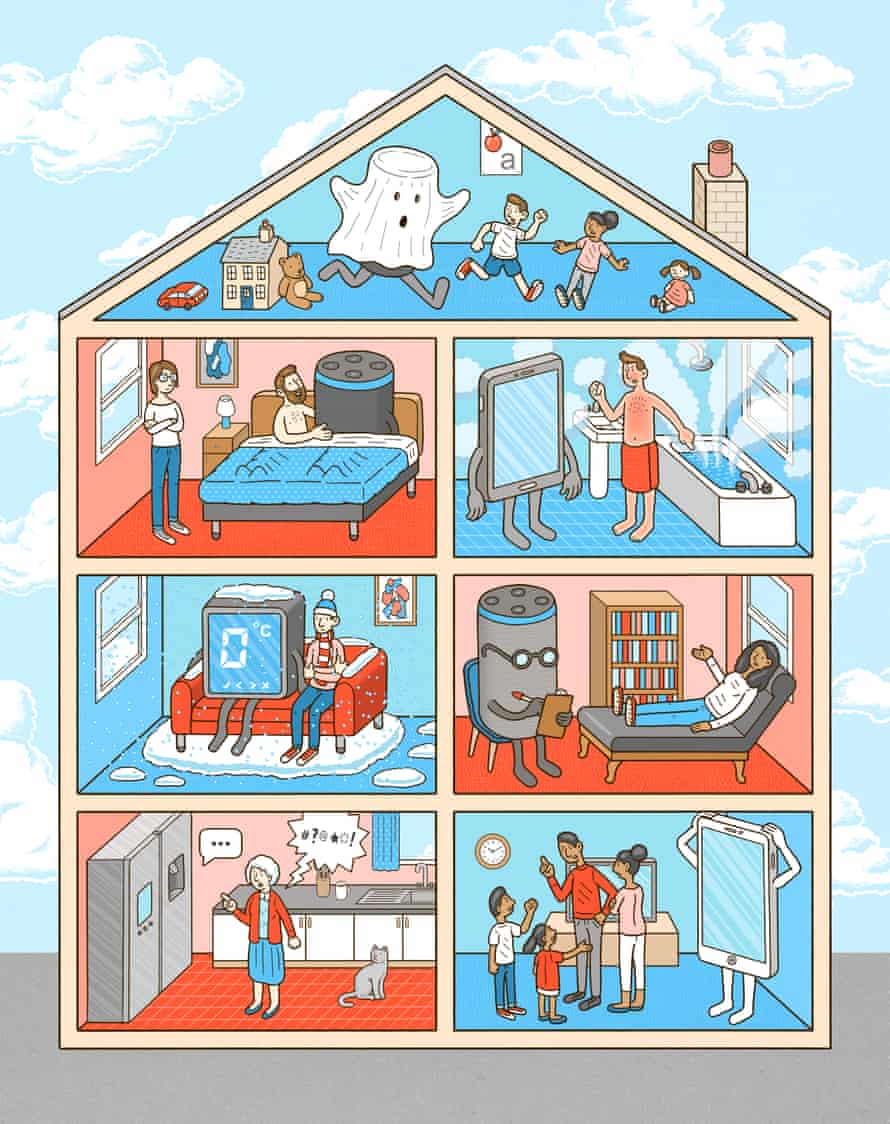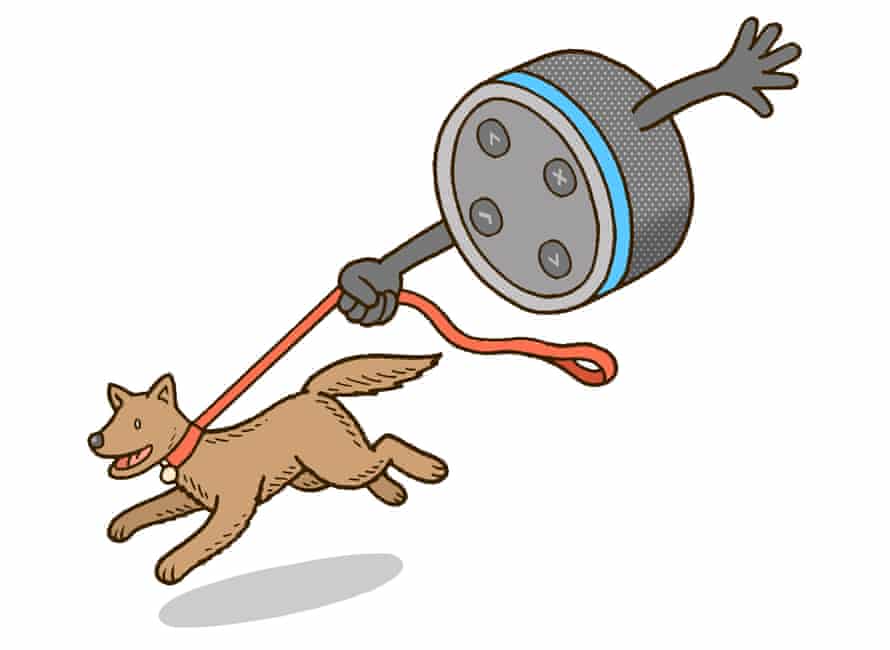Is sensible tech the brand new home battle floor? | Life and elegance
I got here into the kitchen not too long ago to seek out my husband cradling our electrical energy good meter with the sort of tender consideration extra often directed to a new-born, his cellphone clutched in his free hand. “You didn’t flip your workplace heater off final evening,” he mentioned. I didn’t like his tone.
“I did! I went on this morning to show it on once more!”
“You possibly can’t have. Look.” He waved his cellphone. “Final evening we used 10…” (right here he added a unit, presumably of electrical energy, however all that stuff is Martian to me. Ten zaps? Ten whizzes?). “It shouldn’t be that prime.”
“However I turned it off!”
However our good residence had spoken and it’s way more dependable than me, his life associate of 26 years. Our home now has app-enabled gadgets to regulate the heating and the boiler remotely, to examine temperature, CO2 and noise ranges and to see who’s on the door. There are motion-detector cameras within the backyard that ship us movies of foxes threatening my hens, or his tortoises escaping. Since we put in just a few photo voltaic panels, my husband’s smart-home administration has change into extra pressing and extra granular. An app tells him how a lot we’re consuming, but in addition how a lot we’re producing, in actual time. Now he bursts in when it’s sunny, shouting “We’re giving electrical energy to the grid! Use extra!” Within the evenings, I watch Succession; he research our vitality statistics. Know-how has remodeled him right into a one-man residence hub. “I used to suppose residence good expertise was pointless,” he tells me. “However it actually is sensible.”
I hate it. I don’t need my residence to see me once I’m sleeping and know once I’m awake. It makes me really feel bamboozled and disenfranchised: how do I make it hotter once I can’t simply press a button on the wall? Why do I would like an app to reply the door? I additionally get defensive: the local weather emergency means my husband is totally proper to attempt to restrict our vitality consumption, however we find yourself arguing about how lengthy the heated garments airer can run (“It’s 6p an hour!” I protest. “That’s not nothing for those who go away it on all evening,” he counters.) “Aren’t you fearful,” I ask him, “You’ll find yourself like Fb? The robots will malfunction and also you’ll want an angle grinder to boil the kettle?” However he’s an engineer: no angle-grinder situation may faze him.

I’m the one who’s out of step: our properties are smarter than ever. Instruments with cosy, nature-inspired names (Nest, Hive) permit us to observe and management properties even after we aren’t in them; different one-word gadgets (Blink, Ring) hold them protected. A 2019 survey discovered 57% of British properties have at the least one sort of good gadget; again in 2018 YouGov discovered 8% of properties have two or extra. It’s too early for definitive analysis, however it appears Covid #stayathome residing, maybe mixed with feeling life was uncontrolled in different methods, elevated our want to micro- handle our environments. A government report discovered virtually half of UK residents bought at the least one good gadget through the pandemic and greater than half mentioned their good gadget utilization had elevated. However what does this imply for the home-environment variable you possibly can’t management with an app: human relationships?
“It’s virtually inevitable that you just wouldn’t each be equally eager on it,” says expertise author Charles Arthur. “You virtually have a brand new way of life in your home, which you thought you knew, however now it’s: ‘Don’t contact that!’” For Hilda Burke, psychotherapist, {couples} counsellor and writer of The Telephone Habit Workbook, good tech has facilitated a perennial supply of relationship battle: temperature and vitality utilization. “It’s one thing that has been round for ages, however (now) it’s extra data-driven and quantifiable. Earlier than, you may not have proof, however now there may be.” Burke wonders if the urge to regulate and handle our properties is a few sort of evolutionary throwback expressed by expertise. “It’s in all probability all the way down to one thing fairly primary and primal, like holding a stability between being protected and heat and never depleting sources.”
Loads of others really feel there are three folks of their relationship and certainly one of them plugs in. I requested round and gathered their tales of home techno-woe. Joel and Anna dwell in Sydney with two younger kids and a home stuffed with good tech: a voice-controlled residence pod that makes use of Siri, Google Dwelling for procuring lists and a raft of programmed, motion-activated lights. Joel is the fanatic: “I’ve all the time been into computer systems and devices,” he says. “I tolerate it as a result of a person will need to have his hobbies,” says Anna. Some components, nonetheless, she finds difficult. “I’ve been pushed to minor furies with settings not working the way in which I believe they’ve been arrange. Joel’s not right here and I’m bustling round attempting to show issues on and off and it merely gained’t reply to me.” She’s additionally cautious of the house pod: “It does somewhat ‘boop’ noise, like ‘I’m listening to you,’ which is creepy.”
Anna likes the good lights, which dim within the night, go crimson for nocturnal bathroom journeys and change on robotically after they return residence. However even these trigger issues, leaving babysitters plunged in darkness, or turning on unexpectedly: Joel set the lights to inform him when an Uber arrived, then went out to seek out it, leaving Anna and her mom in an inexplicably flashing home. “It was terrifying,” says Anna; “I can see that was a mistake,” concedes Joel.

Issues get weirder after we invite Alexa, Siri and associates into {our relationships}. One recurrent criticism about digital residence assistants is their tendency to solely obey one half of a pair. “Our Alexa refuses to answer me,” says Robert. “She’s linked to our lights, solely solutions to my husband, who has to rescue me when it will get darkish. This morning she inexplicably put each mild on. Level clean refused to show them off once I requested.” When Robert’s husband will get concerned, Alexa is “totally compliant”. My good friend Rhian feels equally snubbed. “Alexa is a soldier of the patriarchy,” she says. “Totally ignores me, whereas responding instantly to Paul. She refuses to hearken to ladies.”
Joel and Anna have skilled this too, although Joel believes his tech will not be inherently misogynistic. “As a result of I set it up, I do know precisely the phrase that must be used and Anna doesn’t,” he explains. “She’ll say it barely unsuitable, then I say it and to her ear it seems like I’m saying precisely the identical factor in a calmer voice.” “It’s very annoying,” says Anna. They’ve each additionally struggled with procuring objects that the Google Dwelling mangled (‘Mississippi’ for miso soup; ‘shut up little Caesars’ for sharp little scissors’). Some have it even worse: “My Alexa interpreted ‘maple syrup’ as ‘nipple rings’, says Leona. “It was an disagreeable episode.” Rebecca’s Alexa informed her son “Each Christmas current that was being delivered to him.”
It’s not all relationship doom. There are joyful robot-human thruples on the market. Some households have seamlessly built-in digital assistants, viewing them as a drawback-free life enhancement. They embrace my good friend Lydia’s. “Siri is a valued member of our household,” she says. “She tells us tales and jokes and methods to spell issues.” Sara’s household makes use of Siri to resolve arguments – “A lot in order that I really feel we’d like Siri on retainer as our therapist,” she says.
Sensible tech can even be a godsend for folks residing with a incapacity or well being situation. Lisa-Marie has restricted mobility and effective motor expertise following a spinal harm; she loves the Google Dwelling put in by her associate: “I discover it genuinely helpful, significantly on unhealthy well being days. My finest bit is having the ability to change the lights on and off from the couch or mattress.” Grudgingly, I see the advantages, however resent residing in a home stuffed with gadgetry I don’t perceive, digitally highlighting my failings (sure, possibly I did go away that heater on). Hilda Burke urges these of us feeling left behind or irritated by a associate’s good residence tech to analyse whether or not it’s their behaviour, or our reactions, which are the issue. “We are able to get fairly meddlesome, when it’s their time and their selection,” she cautions. For these, like me, sometimes feeling judged and located wanting by a coalition of robot-harvested knowledge plus associate, Burke says: “There are mother or father, grownup, or baby methods we will reply. It’s not straightforward to be an grownup: that parental voice – when somebody says, ‘Did you place the radiator on?’ – brings us again to childhood.” The important thing to avoiding battle is to reply calmly, as an grownup: “Sure, I used to be feeling chilly,” moderately than expletive-laden bluster.
Maybe we hold-outs will develop to like the cosy glow of a heat, vivid residence greeting us as we are available from the chilly; a playlist beginning up because the good lock lets us in. However that may not be the top of our issues: what if we’re not good sufficient for our good properties? My husband is proud of all of the circuitry he discovered in his engineering research, as a result of some good tech is genuinely difficult to put in and keep.
“I hope I die first,” is a standard sentiment amongst tech-averse homeowners. “I dwell in concern of my husband dying earlier than me, as a result of I do not know how any of it really works and can be dealing with a unclean, chilly, housebound life,” says Candida. Tom, who’s chargeable for the good tech invasion in his residence, worries that if he died, his household could be unable to perform and would “grieve in chilly darkness, soundtracked by the noise of the burglar alarm.”
Spurred by this, and my husband’s imminent two-week journey to the States, I delicately elevate the query of what occurs if he falls out of the sky. “You could discover and take away the circuit breakers,” he says, immediately dropping me. “However it gained’t be straightforward.” I’m urging him to replace his will accordingly. The robotic takeover could also be imminent (I hope you’ve mentioned please and thanks to Alexa and Siri), however who inherits them earlier than it occurs?


